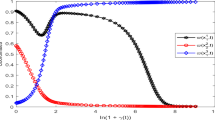Summary.
We examine the strategic role of information transmission in a repeated principal-agent relationship where the agent produces information that is useful to the principal. The agent values continuous employment for the principal because he makes a relationship-specific investment that can yield rents to him when the relationship is renewed. Assuming that the parties are sufficiently impatient, we show that full disclosure of the information produced occurs early in the relationship when the principal can commit to a long-term relationship, when the agent observes his valuation of continuous employment after making a report on information produced, or when the agent obtains a low valuation of continuous employment before making a report. By contrast, a strategic delay in the transmission of information occurs when the principal can only commit to a short-term relationship and the agent obtains a high valuation of continuous employment before making a report.
Similar content being viewed by others
Author information
Authors and Affiliations
Additional information
Received: October 15, 1997; revised version: July 27, 1998
Rights and permissions
About this article
Cite this article
Kahn, C., Tsoulouhas, T. Strategic transmission of information and short-term commitment. Economic Theory 14, 131–153 (1999). https://doi.org/10.1007/s001990050285
Issue Date:
DOI: https://doi.org/10.1007/s001990050285




